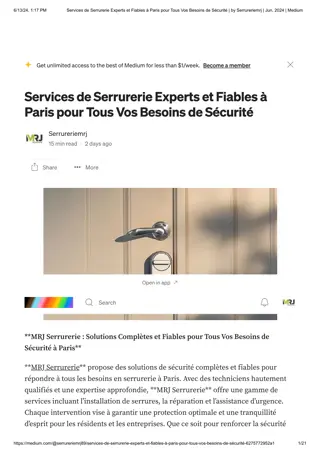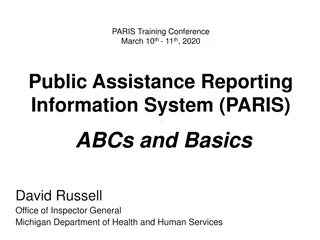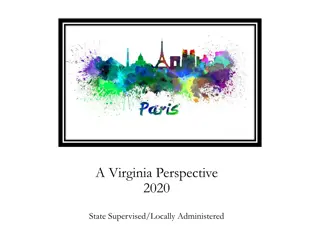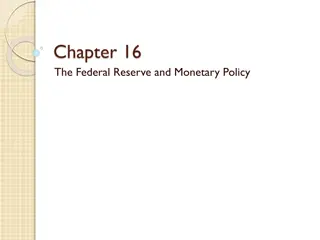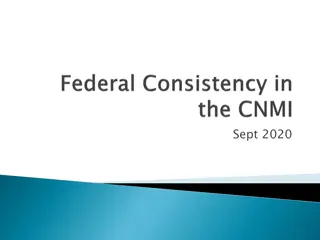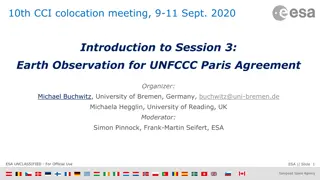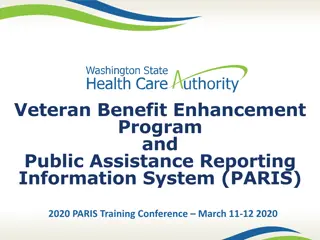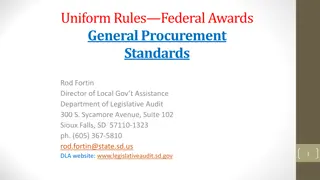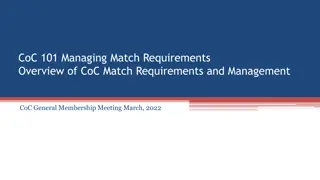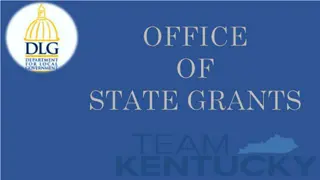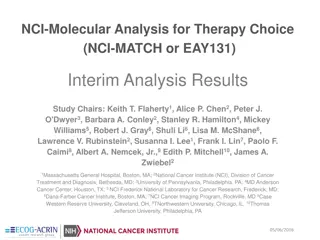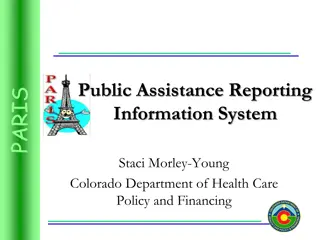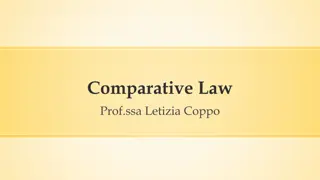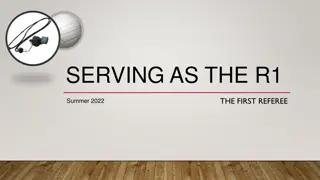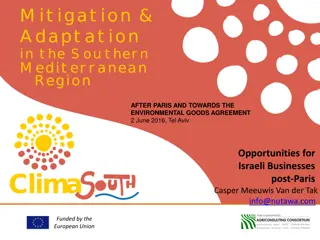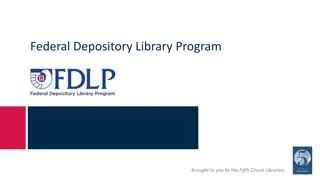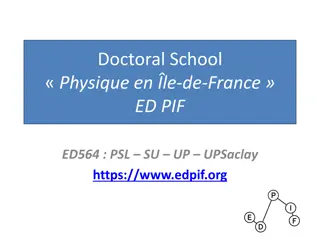Understanding PARIS Federal Match for Success
This presentation covers the Computer Matching Agreement for the PARIS Federal Match program, training objectives, requesting input files, record types, and descriptions. It explains the agreement between various agencies, guidelines for sending beneficiaries for matching, different record types, and their significance in the program. Readers will gain insights into the processes involved in the PARIS Federal Match system.
- PARIS Federal Match
- Computer Matching Agreement
- Training Objectives
- Record Types
- Beneficiary Inclusion
Download Presentation

Please find below an Image/Link to download the presentation.
The content on the website is provided AS IS for your information and personal use only. It may not be sold, licensed, or shared on other websites without obtaining consent from the author. Download presentation by click this link. If you encounter any issues during the download, it is possible that the publisher has removed the file from their server.
E N D
Presentation Transcript
PARIS-Federal Match A RECIPE FOR SUCCESS
Training Objectives This presentation will provide the following: Understanding of the Computer Matching Agreement Ability to request an input file Understanding of record types An overview of the Income Discrepancy program An overview of the Residency Verification program An overview of the Other Health Care (OHC) Identification program
Computer Matching Agreement The Computer Matching Agreement between the Department of Defense Manpower Data Center, State Public Assistance Agencies, and the Department of Health and Human Services, Administration for Children and Families authorizes the PARIS Federal Match This is a Memorandum of Agreement with a term of 18 months The agreement can be extended for an additional 12 months
Requesting the Input File Each state must decide whether to send all Medicaid beneficiaries to the match or to exclude some beneficiaries. Beneficiaries may be excluded based on the following: Demographics, such as the age of the beneficiary Specific programs, such as Foster Care Youth For guidelines on producing the file, see the PARIS State Input Record format located at https://www.acf.hhs.gov/paris/state-input-record-format To include a beneficiary for the match, use a Y at position 301 of the record format
List of Record Types Record Types indicate the type of Federal employment category or service the individual is based in. They are: MA Active Military Duty MR Retired Military MV Military Reservist CD Department of Defense (DOD) Civilian CR Civilian Retired OPM CO Civilian OPM NF Non-Appropriated Funds SR Surviving Family Member
Record Type Description Record types MA, MR, MV, and CD appear most often in the match CO and CR are records from the Office of Personnel Management (OPM). We are not currently receiving these record types in our match SR is provided in our current matches. These are surviving family members who are receiving benefits. The SR record type is used to determine Other Health Coverage, which is discussed later Record type NF represents an employee who is not civil service but is paid with funds not allocated by Congress. These employees work in exchanges and other non-civil service jobs on military bases in the United States and overseas.
Income Discrepancy Program Case files are reviewed to ensure that the client reported the federal income and whether the client is eligible Medicaid for ineligible clients is discontinued, resulting in significant cost savings for the state Verification of federal income with the client is recommended as there are can be errors in interpretation or inaccurate information: The gross pay listed is the amount the client is eligible for, but the State must check the pay status column, which indicates whether the client is actually receiving the pay The time period the gross pay was earned varies by the income source Gross pay for Military Active Duty is year-to-date, so using the Basic Salary figure for this record type is suggested Clients may have had a change of income or status since the match
Residency Verification Program This program reviews the eligibility of clients reported as record type MA, or active military duty Eligibility for active military is reconsidered based on the following: The client is possibly not stationed in the state and would not meet residency requirements The client may be receiving TRICARE for their healthcare insurance and does not require Medicaid The client has not reported their change in circumstance when entering the military Contact is made with the client to verify the client s military status, residency, and address There may have been a change in military status since the time of the match To verify military status, the following Servicemembers Civil Relief Act website provides fairly accurate information. The website also has multiple record capabilities: https://scra.dmdc.osd.mil/scra/#/single-record
Other Health Coverage (OHC) Identification Program This program identifies clients who are receiving TRICARE health insurance TRICARE is the health care program serving active duty service members, National Guard and Reserve members, retirees, their family, survivors, and certain former spouses worldwide Coding clients with their TRICARE coverage places Medicaid as the payor of last resort and results in significant cost savings to states
OHC and DEERS Access TRICARE coverage is verified with the use of the Defense Enrollment Eligibility Reporting System, or DEERS California lost access to DEERS in March 2019, as did other states Loss of access is due to the expiration of an agreement between CMS and DoD, and a new agreement has not been signed yet California s OHC program is currently on hold due to states loss of access to DEERS There is a TPL-TAG group working to try to move this forward and get access to states. California s POC for this group is MaryKay Cary
Conclusion The PARIS Federal Match results in significant savings to states in the areas of income, residency, and other health care coverage In a previous match, California recognized the following based on income and residency information: Closed 907 beneficiaries and increased Share of Cost for 30 beneficiaries based on income Closed 709 beneficiaries based on loss of residency due to active military status Savings from these closures was $6,246,378 Savings will substantially increase with the use of DEERS





